In today’s digital age, enterprise software development plays a vital role in empowering organizations to streamline their operations, enhance productivity, and stay ahead in a competitive market.
However, the process of developing enterprise software can be complex and challenging.
At Codepaper, a leading custom software development company in Toronto, we understand the intricacies involved in building robust and scalable software solutions for enterprises.
In this blog post, we will delve deeper into the world of enterprise software development.
Exploring the best practices and strategies that organizations should consider to ensure successful outcomes.
Understanding the Unique Challenges of Enterprise Software Development
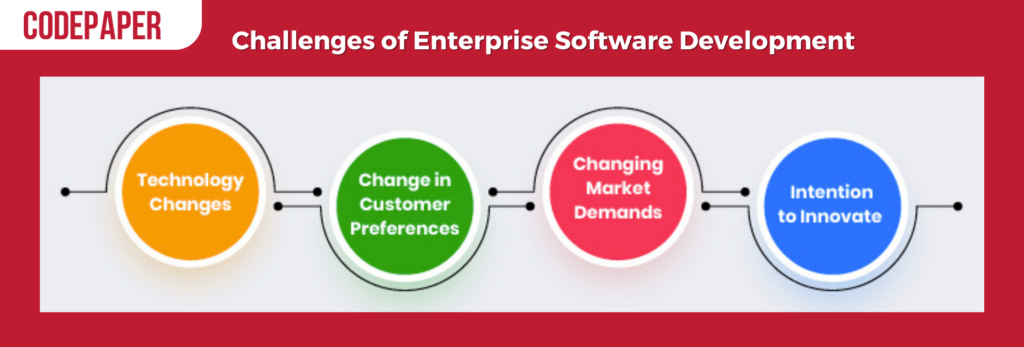
Enterprise software development presents a unique set of challenges that distinguish it from other types of software development projects.
The scale and complexity of enterprise systems, the need for seamless integration with existing infrastructure, stringent security and compliance requirements, and the ever-evolving business needs are just a few factors that make it a specialized field.
Codepaper brings expertise and experience to tackle these challenges.
Working closely with clients to develop tailored solutions that meet their specific requirements and objectives.
Some of the key challenges include:
- Complexity and Scale: Enterprise software solutions need to handle large volumes of data, support numerous users, and integrate with existing systems, making scalability and complexity management crucial.
- Security and Compliance: Enterprises deal with sensitive data, requiring robust security measures and compliance with industry regulations to protect confidential information.
- Integration with Legacy Systems: Enterprises often have legacy systems that need to be integrated with new software solutions, posing challenges in terms of data migration and seamless integration.
- User Adoption and Change Management: Large organizations may face resistance to change and challenges in user adoption. Ensuring a smooth transition and comprehensive training programs are vital for successful implementation.
Benefits of Enterprise Software Development
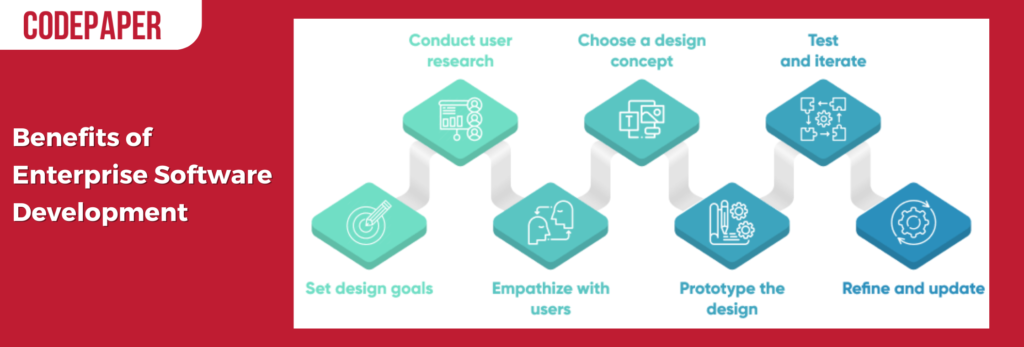
Investing in enterprise software development offers numerous benefits for organizations.
It enables automation of complex business processes, improves operational efficiency and productivity, enhances data management and analytics capabilities, facilitates seamless collaboration across departments, and enables organizations to gain a competitive edge in the market.
With our custom software development services, Codepaper helps businesses leverage these benefits, driving innovation and growth.
Implementing enterprise software development practices can yield several benefits for businesses, including:
Enhanced Efficiency: Tailored software solutions streamline complex business processes, automate repetitive tasks, and optimize workflows, leading to improved operational efficiency.
Increased Productivity: Enterprise software solutions enable employees to work more efficiently by providing tools and features that enhance productivity and collaboration.
Data-Driven Decision Making: By centralizing data and providing advanced analytics capabilities, enterprise software empowers organizations to make data-driven decisions, gain valuable insights, and identify trends.
Scalability and Flexibility: Custom-built enterprise software can be designed to accommodate growth, easily scale with the organization’s evolving needs, and adapt to changing market trends.
Competitive Advantage: Well-designed software solutions can give businesses a competitive edge by enabling them to deliver superior customer experiences, optimize resource allocation, and stay ahead in the market.
Ready to revolutionize your business with cutting-edge Enterprise Software Development solutions? Contact Codepaper Technologies Inc. today and discover how our expert team can transform your organization’s digital landscape and drive unprecedented growth and success. Don’t miss out on the opportunity!
Best Practices for Successful Enterprise Software Development
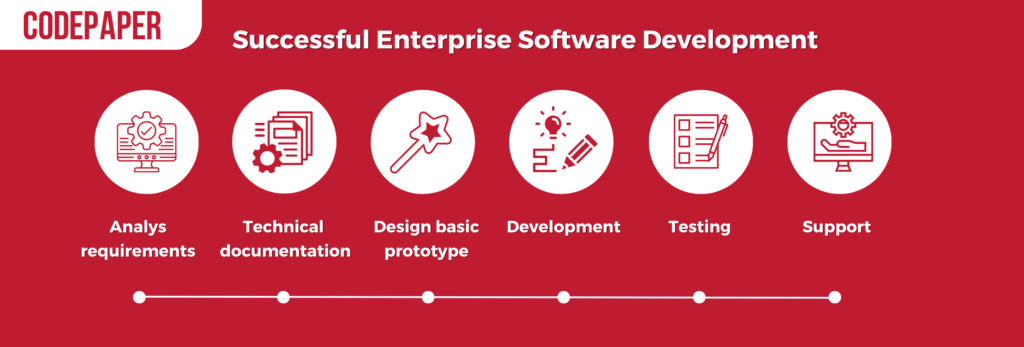
To ensure successful enterprise software development, it is crucial to follow industry best practices.
These practices encompass various aspects of the development process, including requirement analysis, project planning, software architecture design, coding standards, quality assurance, and post-deployment support.
At Codepaper, we adhere to these best practices to deliver high-quality enterprise software solutions that meet our clients’ expectations.
Some key best practices include:
- Thorough Requirement Analysis: A comprehensive understanding of business requirements is crucial for successful software development.
Codepaper conducts detailed requirement data analysis, engaging with stakeholders to identify and document their needs, goals, and expectations.
- Agile Development Approach: Agile methodologies, such as Scrum or Kanban, offer flexibility and adaptability throughout the development lifecycle.
Embraces Agile practices, ensuring continuous collaboration, rapid iterations, and frequent client feedback.
- Scalable and Modular Architectures: Enterprise software should be designed with scalability in mind.
ocuses on creating modular and extensible architectures, allowing for easy integration with other systems and accommodating future growth.
- Security and Data Privacy: Data security is paramount in enterprise software development.
Codepaper incorporates robust security measures, such as encryption, access controls, and regular security audits, to protect sensitive data and ensure compliance with regulatory standards.
- Effective Quality Assurance: Rigorous testing and quality assurance processes are essential to deliver reliable and bug-free software.
Codepaper follows industry-standard testing practices, including functional testing, performance testing, and user acceptance testing, to ensure the software meets the highest quality standards.
Strategies for Efficient and Cost-Effective Enterprise Software Development
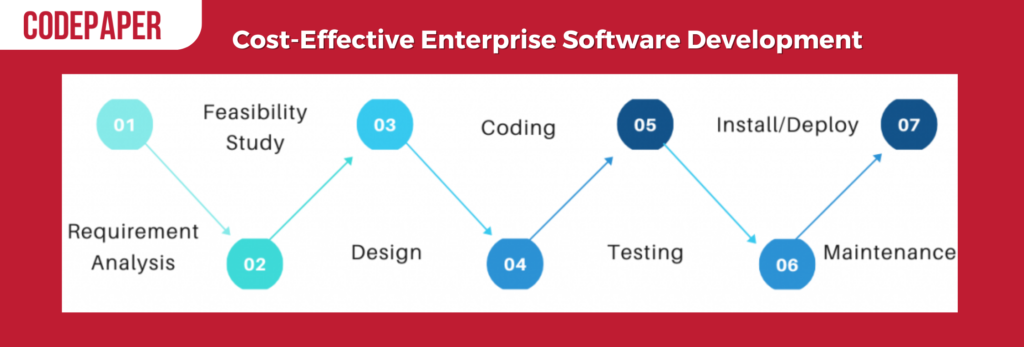
Efficiency and cost-effectiveness are crucial considerations in enterprise software development.
Codepaper employs several strategies to streamline the development process and optimize costs without compromising quality. These strategies include:
Modular Development: Break down the software development process into modular components, allowing for parallel development, easy integration, and future scalability.
Continuous Integration and Deployment: Implement continuous integration and deployment (CI/CD) practices to automate the build, test, and deployment processes, enabling faster and more reliable software releases.
Cloud-Based Solutions: Leverage cloud computing platforms to reduce infrastructure costs, ensure scalability, and improve accessibility for distributed teams and users.
Collaboration and Communication: Foster effective collaboration and communication among cross-functional teams, stakeholders, and clients throughout the software development lifecycle, utilizing project management tools and regular meetings.
Agile Project Management: Embrace agile project management methodologies like Scrum or Kanban to enhance team productivity, adapt to changing requirements, and deliver incremental value throughout the development process.
Outsourcing and Offshoring: Consider outsourcing certain aspects of the development process or partnering with offshore teams to leverage cost advantages, access specialized expertise, and accelerate project timelines.
Balancing Innovation and Stability in Enterprise Software Development
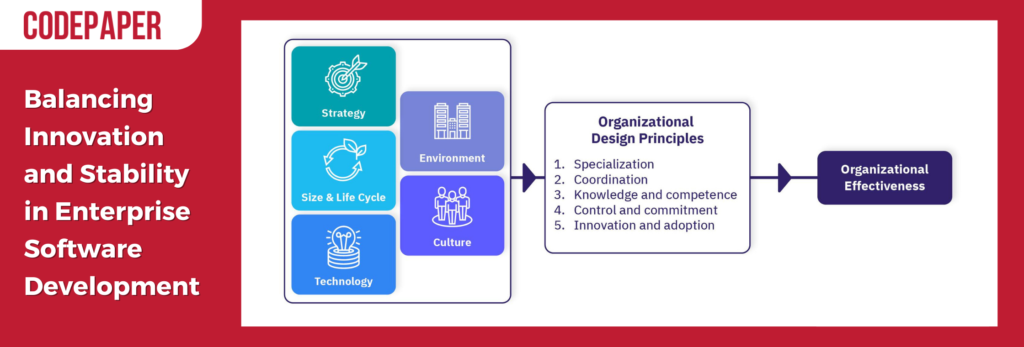
Enterprise software development requires finding the right balance between innovation and stability.
While innovation drives competitive advantage, stability ensures reliability and consistency. Key considerations include:
Incremental Upgrades: Adopt a phased approach to software upgrades, introducing innovative features and enhancements gradually to minimize disruption and ensure system stability.
Future-Proof Architecture: Design software solutions with a modular and scalable architecture that allows for seamless integration of new technologies and future expansion.
Technology Evaluation: Continuously evaluate emerging technologies and assess their compatibility with existing systems, scalability, security, and long-term viability before incorporating them into the software stack.
Case Studies: Successful Enterprise Software Development Projects
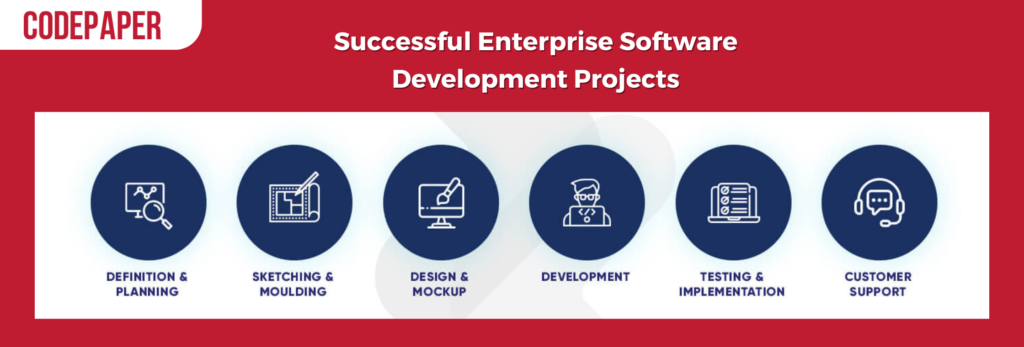
To illustrate the impact of effective enterprise software development, let’s explore a few case studies:
Construction Management Software: Codepaper developed a comprehensive construction management software solution.
Streamlined project planning, resource allocation, and collaboration for a large construction company.
The software improved project efficiency, reduced costs, and enhanced communication among stakeholders.
Supply Chain Optimization System: Codepaper partnered with a logistics company to develop a supply chain optimization system.
The solution integrated various data sources, enabling real-time visibility, optimizing inventory management, and improving delivery efficiency, resulting in significant cost savings.
Conclusion: Empowering Enterprises through Effective Software Development
In conclusion, enterprise software development is a complex process that requires expertise, adherence to best practices, and strategic implementation of effective strategies.
Codepaper, as a leading custom software development company in Toronto, possesses the knowledge, skills, and experience to deliver successful enterprise software solutions.
By understanding the unique challenges, embracing best practices, and employing efficient strategies.
Codepaper empowers organizations to unlock their full potential through effective software development.
Whether it’s developing new software from scratch or modernizing existing systems.
Codepaper leverages its expertise in software development, ensuring that the end product aligns with clients’ business goals and requirements.
By partnering with Codepaper, businesses can rely on our commitment to delivering tailored software solutions that drive innovation, efficiency, and growth.
At Codepaper, we understand that each enterprise software development project is unique, and we approach it with dedication and a client-centric focus.
Our team of experienced developers, project managers, and quality assurance specialists work collaboratively with clients, ensuring effective communication, transparency, and timely delivery of projects.
If your organization is ready to embark on an enterprise software development journey.
Codepaper is here to guide you every step of the way.
Contact us today to discuss your software development needs.
And discover how we can help you achieve your business objectives through effective software solutions.
Together, let’s revolutionize your enterprise with the power of custom software development.